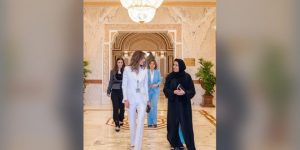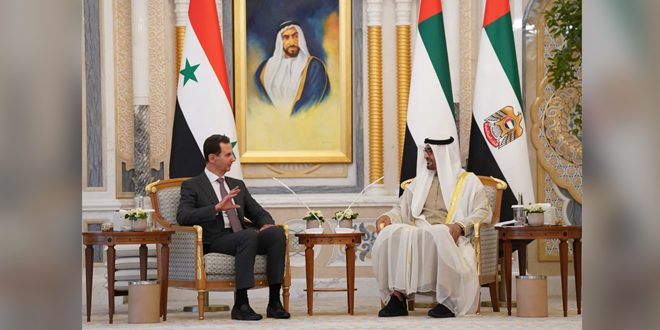Syrian President Bashar al-Assad arrived in the United Arab Emirates (UAE) on Sunday for an official visit, accompanied by his wife, Asma al Assad, when more Arab states have signalled openness to ease the isolation of Damascus.
According to Reuters the visit was marked with more ceremony than his previous trip to the UAE last year, which had been his first to an Arab state since the Syrian civil war began in 2011 when Gulf states, including the UAE backed rebels fighting to overthrow Assad.
State media said he was met by President Sheikh Mohammed bin Zayed al-Nahyan on arrival in Abu Dhabi on Sunday and received a canon salute as his convoy entered the royal palace. Assad’s plane was greeted by Emirati fighter jets.
“We held constructive talks aimed at developing relations between our two countries,” Sheikh Mohammed later said in a Twitter post. “Our discussions also explored ways of enhancing cooperation to accelerate stability and progress in Syria and the region.”
SANA reported that Assad and Bin Zayed held official talks at Qasr Al Watan in the UAE capital, Abu Dhabi, in the presence of the two official delegations.
The talks dealt with means of enhancing historical bilateral relations and economic cooperation between Syria and the UAE.
The talks also touched upon the positive developments in the region and the importance of taking advantage of those developments to achieve stability, further safety and prosperity.
President al-Assad considered that the UAE’s positions have always been rational and moral, describing its role in the Middle East as positive and effective in ensuring strong relations between Arab countries, stressing that this role intersects with that of Syria’s vision of the need to strengthen bilateral relations between Arab countries to reach the joint Arab action that unites Arab countries and benefits the interests of their peoples.
President al-Assad stressed that dissonance and the severance of relations is an incorrect principle in politics and that it is normal for relations between Arab countries to be solid and fraternal.
First outing for Asma Al-Assad
The Syrian presidency said Asma al Assad, on her first known official visit abroad with Assad since 2011, met with Sheikha Fatima bint Mubarak, the Emirati president’s mother and regarded in the UAE as the “Mother of the Nation.”
According to SANA, Sheikha Fatima bint Mubarak has received the First Lady Mrs. Asma al-Assad and the accompanying delegation at “Al-Bahr Palace” in the UAE capital, Abu Dhabi.
The meeting dealt with the multiple aspects of cooperation in humanitarian action, social development and multifaceted empowerment, as well as the possibility of deepening joint initiatives between the various non-governmental bodies of the two brotherly countries, particularly after the earthquake hit Syria to alleviate the suffering of its victims as far as possible.
Asma al-Assad thanked the UAE and its people for their emergency response after the earthquake.
She highlighted the role of Sheikha Fatima Bint Mubarak for her generous initiative to offer treatment to some cases of victims of earthquakes in the UAE.
Sheikha Fatima, in her turn, underlined the deep relations between the two countries and peoples, pointing out that the UAE will continue mitigating the repercussions of the earthquake.
U.S. ally
The UAE, a U.S. ally, has led a shift in the Middle East towards reviving ties with Assad, who held talks in Oman last month on his first foreign trip since the devastating earthquake hit Syria and Turkey and visited Russia earlier this month, according to Reuters.
Saudi Arabia, Qatar, and, to a lesser extent, the UAE once backed rebels against Assad. But Abu Dhabi has rebuilt ties with Damascus in recent years despite U.S. objections as it looks to counter the influence of Iran, which along with Russia, helped Assad turn the tide against his opponents.
Regional powerhouse Saudi Arabia, which recently reached an agreement with rival Iran to restore bilateral ties, has opened the door for possible dialogue with Damascus, especially on humanitarian issues, saying Arab consensus was building that isolating Syria was not working.
Qatar, like Washington, has voiced opposition to any moves towards rehabilitating or normalizing ties with Assad, citing his government’s brutality during the conflict and the need to see progress toward a political solution.
Hundreds of thousands of people have died in the Syria conflict, which spiralled out of an uprising against Assad, drew in numerous foreign powers, and splintered the country.
Key barrier
Damascus hopes the regional reconciliation will unlock long-awaited funds to rebuild the battered country. However, analysts said it is unlikely to happen on any large scale for now, AP reported.
One key barrier: Syria has not implemented U.N. Security Council resolution 2254, adopted in December 2015 as a road map to peace in Syria. Acceptance of the road map is a key demand of the U.S. and the European Union for normalizing relations with Damascus.
The World Bank said Sunday that Syria’s real gross domestic product is expected to contract by 5.5% in 2023 following the earthquake, with physical damages estimated at $3.7 billion and economic losses at $1.5 billion, bringing the total estimated impact to $5.2 billion. That’s on top of the preexisting damages from 12 years of war.
Ukraine’s Zelensky imposes sanctions on Syria’s Assad, other officials
Ukrainian President Volodymyr Zelensky signed a decree on Saturday imposing sanctions on 300 individuals, including the Syrian regime leader Bashar al-Assad, The New Arab reported.
Sanctions were also imposed against Syrian Prime Minister Hussein Arnous and the country’s Foreign Minister Faisal Miqdad. A number of Russian citizens were sanctioned as well.
The document, uploaded on the presidential website, highlighted that Assad was subject to the blocking of assets and a number of other measures.

Some 114 entities were also blacklisted – including Russian research and production and shipbuilding enterprises and aviation industry companies, including the Kalashnikov and Almaz-Antey concerns and the Ural plant. Several Iranian firms were also sanctioned.
Ukraine cut diplomatic ties with Syria in June last year after Damascus recognized the Russian-occupied areas of eastern Ukraine as independent states.
The sanctions included the freezing of assets, restrictions on trade and transit of resources, a ban on participation in privatization in Ukraine, the suspension of economic and financial obligations, and the revocation of Ukrainian state awards.
Palestinian Islamic Jihad claims senior engineer was assassinated by Israel in Syria
The Gaza Strip-based Palestinian Islamic Jihad terror group on Sunday morning claimed one of its senior members, an engineer, was assassinated by Israel in Syria, according to The Times of Israel.
In a statement, the military wing of the PIJ, the al-Quds Brigades, said Ali Ramzi al-Aswad, 31, was shot dead by “agents of the Zionist enemy” in the Damascus area. The terror group said al-Aswad was a “leader” and an engineer.
The PIJ described al-Aswad’s killing as a “cowardly assassination bearing the fingerprints of the Zionist enemy.”
There were no further details on the alleged assassination. Syrian media outlets reported the killing took place in the Damascus suburb of Qudssaya.
The terror group said al-Aswad’s family originated from the northern city of Haifa and settled in a refugee camp in Syria following Israel’s 1948 War of Independence. The PIJ said he joined the group and worked as an engineer, eventually becoming a senior commander.
In an apparent reference to the assassination, Prime Minister Benjamin Netanyahu at a weekly cabinet meeting said Israel would “get to the terrorists and the architects of terror everywhere.”
“Our forces are working around the clock to deal with the terrorists and thwart terror infrastructure. Dozens of terrorists were killed in the last month; many others were arrested. I repeat: All those who try to harm the citizens of Israel, they will pay with their lives,” Netanyahu said.
U.S. has seen a ‘significant spike’ in aggressive Russian military flights in Syria this month.
CNN reported that the U.S. has seen a “significant spike” in aggressive Russian military flights in Syria this month, the commander of US Central Command said Thursday, two days after Russian jets harassed and collided with a US drone over the Black Sea.
Gen. Erik Kurilla told a Senate Armed Services Committee hearing that Russian ground-attack aircraft fly over US bases loaded with weapons “in an attempt to try and be provocative.” He described the Russian flights as “not what we expect of a professional air force.”
Asked if the aggressive flights were new, Kurilla responded, “It’s not new, but we have seen a significant spike since about 1 March in Syria.”
“What we are seeing, though, is an increase recently in the unprofessional and unsafe behaviour of the Russian air force in the region,” he said.
The US has approximately 900 troops in Syria at two bases as part of the ongoing campaign to defeat ISIS. The US and Russia have a deconfliction line between the two militaries to ensure operations do not result in a miscalculation or an unintentional escalation.
Kurilla said the Russian actions were a means of trying to “renegotiate the deconfliction protocols that they violate every day.”
Coalition extends condolences to SDF over the death of 9 fighters in KRI
The U.S.-led Global Coalition extended a message of sympathy to the Syrian Democratic Forces (SDF) on Saturday after the latter lost nine of its fighters in a helicopter crash in the Kurdistan Region of Iraq (KRI).
In a tweet, Combined Special Ops Joint Task Force-Levant extended its “heartfelt condolences to our SDF partner force and the loved ones of the heroes recently killed in a helicopter crash.”
The tweet added, “Their sacrifice and dedication to service for their country won’t be forgotten as they continue to maintain safety and stability in Syria.”
The SDF announced that it had lost nine of its fighters, including the commander of its Counter-Terrorism Units (YAT), following a crash of two helicopters en route to the city of Sulaymaniyah, due to bad weather conditions.
The fighters were travelling to the Kurdish city in Iraq within the framework of exchanging security and military experiences in order to boost YAT’s security and fighting abilities, according to a statement released by the SDF.


